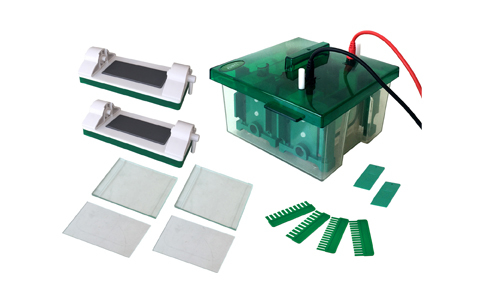Electrophoresis is one of the most widely used laboratory diagnostic techniques in the diagnosis of diseases, specifically hereditary diseases. This technique consists in the use of the movement of proteins in a time interval, thanks to the production of an electric field.
This technique is capable of detecting genetic diseases and pathologies that would otherwise be missed; first of all, electrophoresis is an excellent laboratory tool for the identification of pathologies related to protein transport.
Electrophoresis is used to detect changes in the size, structure and profile of nucleic acids, proteins or lipids
These alterations can be used to diagnose a variety of conditions, from hereditary diseases, trace contaminants in drinking water and pesticide residues in food, this technique is also used in kidney transplantation and other surgical operations to verify compatibility between donor and recipient.
In addition, electrophoresis, along with other types of tests, is vital in the diagnosis of hereditary diseases, especially those transmitted from parent to child, and is used to detect specific genetic characteristics of the patient, such as mutations and protein changes.
Advantages for specialists of using electrophoresis to diagnose their research
This is of particular importance for the monitoring and treatment of inherited conditions, such as Prader-Willi syndrome, Down syndrome or Klinefelter syndrome; electrophoresis is used to separate and analyze fragments of nucleic acids.
This analysis is used to find genetic characteristics that are particularly useful for the diagnosis and treatment of hereditary diseases; this technique can also be used to detect mutations in genes related to cancer.
The electrophoresis technique has played a key role in the diagnosis of multiple hereditary diseases and pathologies, improving the treatments and prognosis of patients
The information obtained through electrophoresis can be applied to develop therapies that are tailored to a patient’s specific mutation and improve the prognosis of the disease; this, is an invaluable tool for the diagnosis of hereditary diseases and is one of the most reliable and useful laboratory diagnostic techniques.
In conclusion, electrophoresis is used to detect nucleic acid, protein and lipid pathologies that would otherwise go undetected; furthermore, the results of electrophoresis can be applied to the creation of personalized drugs and treatments based on the patient’s specific mutation.
At Kalstein as a MANUFACTURER, researchers will be able to acquire the best quality electrophoresis at a low cost for use in their laboratories
In Kalstein you will be able to acquire the best electrophoresis that is why we invite you to visit our website HERE to enjoy great offers and unbeatable prices, since we are MANUFACTURERS and we can guarantee your effective purchase.
In the link below you can choose one of the best electrophoresis manufactured in the market HERE

